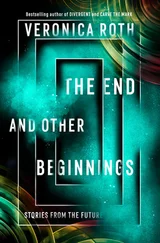It is now okay to escape.
I stumble out of the scanner, and the air opens up around me. Cara gives me a pointed look, but doesn’t say anything.
When Tris takes my hand after going through the scanner herself, I barely feel it. I remember going through my fear landscape with her, our bodies pressed together in the wooden box that enclosed us, my palm against her chest, feeling her heartbeat. It’s enough to ground me in reality again.
Once Uriah is through, Zoe waves us forward again.
Beyond the security checkpoint, the facility is not as dingy as it was before. The floors are still tile, but they are polished to perfection, and there are windows everywhere. Down one long hallway I see rows of lab tables and computers, and it reminds me of Erudite headquarters, but it’s brighter here, and nothing seems to be hidden.
Zoe leads us down a darker passageway on the right. As we walk past people, they stop to watch, and I feel their eyes on me like little beams of heat, making me warm from throat to cheeks.
We walk for a long time, deeper into the compound, and then Zoe stops, facing us.
Behind her is a large circle of blank screens, like moths circling a flame. People within the circle sit at low desks, typing furiously on still more screens, these ones facing out instead of in. It’s a control room, but it’s out in the open, and I’m not sure what they’re observing here, since all the screens are dark. Clustered around the screens that face in are chairs and benches and tables, like people gather here to watch at their leisure.
A few feet in front of the control room is an older man wearing a smile and a dark blue uniform, just like all the others. When he sees us approaching, he spreads his hands as if to welcome us. David, I assume.
“This,” the man says, “is what we’ve waited for since the very beginning.”
TRIS
I TAKE THE photograph from my pocket. The man in front of me—David—is in it, next to my mother, his face a little smoother, his middle a little trimmer.
I cover my mother’s face with my fingertip. All the hope growing inside me has withered. If my mother, or my father, or my friends were still alive, they would have been waiting by the doors for our arrival. I should have known better than to think what happened with Amar—whatever it was—could happen again.
“My name is David. As Zoe probably told you already, I am the leader of the Bureau of Genetic Welfare. I’m going to do my best to explain things,” David says. “The first thing you should know is that the information Edith Prior gave you is only partly true.”
At the name “Prior” his eyes settle on me. My body shakes with anticipation—ever since I saw that video I’ve been desperate for answers, and I’m about to get them.
“She provided only as much information as you needed to meet the goals of our experiments,” says David. “And in many cases, that meant oversimplifying, omitting, and even outright falsehood. Now that you are here, there is no need for any of those things.”
“You all keep talking about ‘experiments,’” Tobias says. “ What experiments?”
“Yes, well, I was getting to that.” David looks at Amar. “Where did they start when they explained it to you?”
“Doesn’t matter where you start. You can’t make it easier to take,” Amar says, picking at his cuticles.
David considers this for a moment, then clears his throat.
“A long time ago, the United States government—”
“The united what?” Uriah asks.
“It’s a country,” says Amar. “A large one. It has specific borders and its own governing body, and we’re in the middle of it right now. We can talk about it later. Go ahead, sir.”
David presses his thumb into his palm and massages his hand, clearly disconcerted by all the interruptions.
He begins again:
“A few centuries ago, the government of this country became interested in enforcing certain desirable behaviors in its citizens. There had been studies that indicated that violent tendencies could be partially traced to a person’s genes—a gene called ‘the murder gene’ was the first of these, but there were quite a few more, genetic predispositions toward cowardice, dishonesty, low intelligence—all the qualities, in other words, that ultimately contribute to a broken society.”
Конец ознакомительного фрагмента.
Текст предоставлен ООО «ЛитРес».
Прочитайте эту книгу целиком, купив полную легальную версию на ЛитРес.
Безопасно оплатить книгу можно банковской картой Visa, MasterCard, Maestro, со счета мобильного телефона, с платежного терминала, в салоне МТС или Связной, через PayPal, WebMoney, Яндекс.Деньги, QIWI Кошелек, бонусными картами или другим удобным Вам способом.












